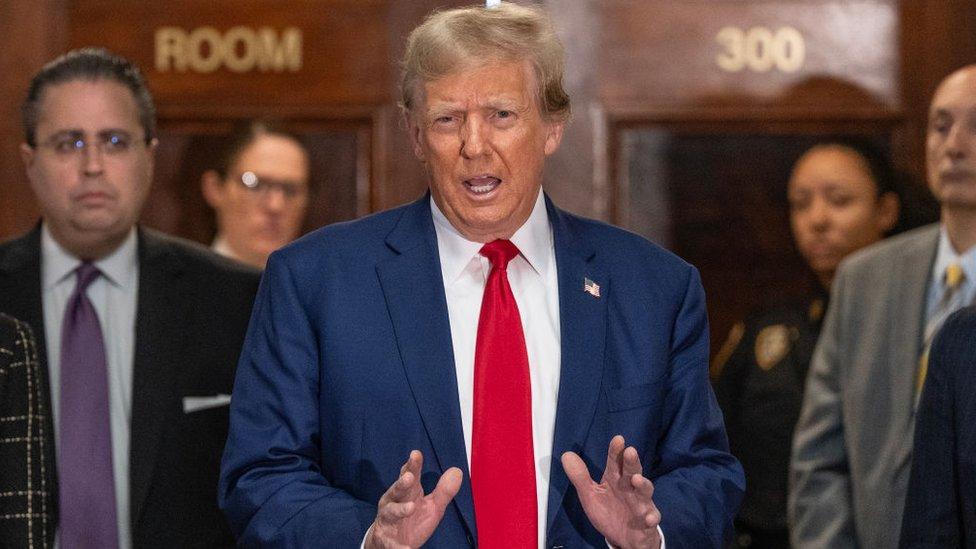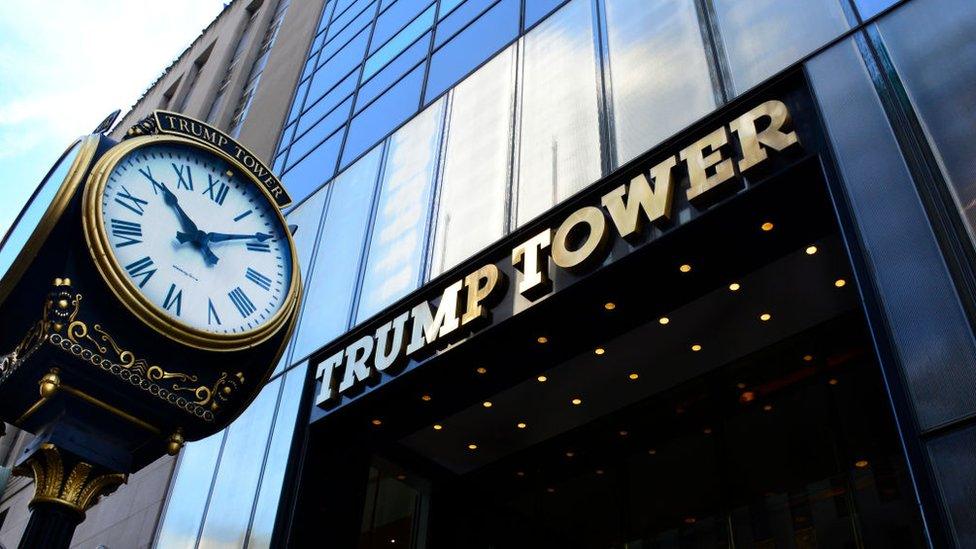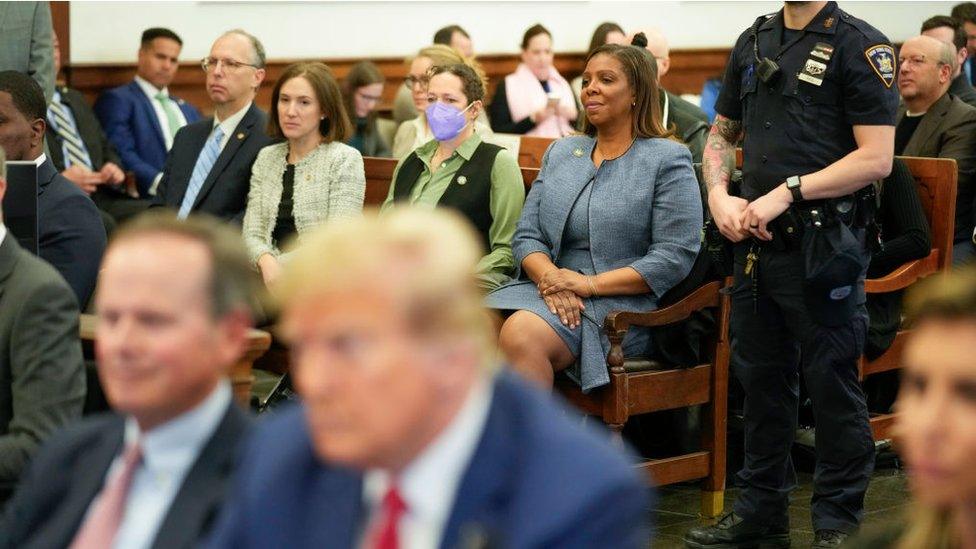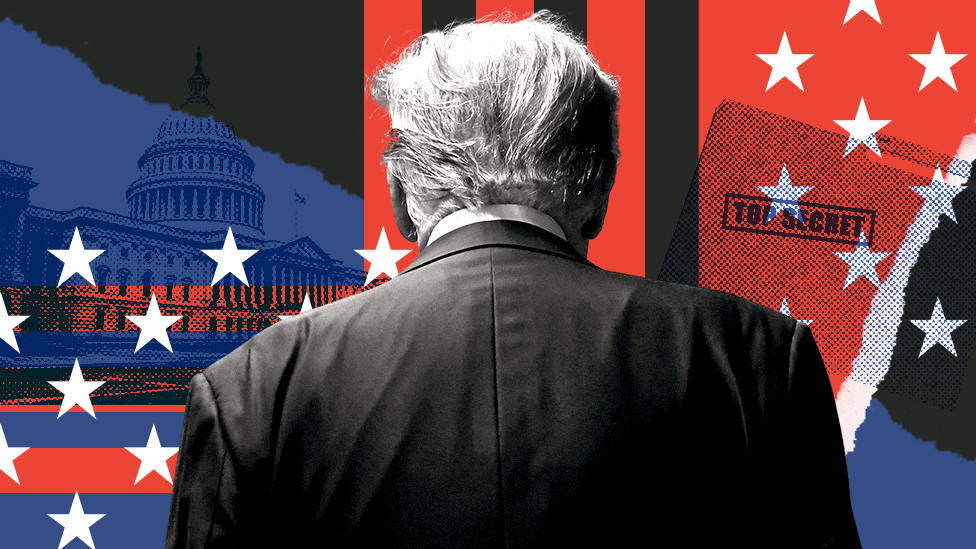Donald Trump must pay $354m in fraud damages. How could he do it?
- Published

Donald Trump has been ordered to pay more than $350m in damages in a civil fraud case, with interest charges potentially adding another $100m - and legal experts say even a man with the former president's wealth will feel the pain.
"He's not going to suddenly become working class," said former Manhattan prosecutor Diana Florence. "But it's just going to be a lot of cash. His fortune will be significantly reduced."
The judge in the case delivered his final ruling on Friday, ordering Mr Trump to pay the damages and banning him from doing business in the state for three years. The decision, however, stopped short of dissolving the Trump family business altogether.
Mr Trump denies committing fraud and is expected to launch an appeal, which would put the decision on hold until a higher court reviews the case.
But if he wants to avoid paying the fine or having his personal assets seized while the appeal process plays out, he still has to deposit the full amount within 30 days.
Can Trump afford $354m?
One calculation from Forbes Magazine put Mr Trump's total net worth at $2.6bn. The New York Attorney General's Office estimated his annual net worth at $2bn in 2021.
Based on those estimates, a penalty of $354.9m would cost Mr Trump roughly 14-17% of his wealth.
On top of this looming penalty, however, he already owes the writer E Jean Carroll $83.3 million in damages from a separate defamation case that concluded in January. His legal fees are also mounting as he battles four criminal cases at the federal and state level.
These combined financial burdens - in excess of half a billion dollars - may constitute more cash than Mr Trump has available.
Legal experts say he has several potential options.
Trump could secure a bond, but it will cost him
To avoid paying everything upfront, Mr Trump could try to secure a bond - a third-party guarantee that he can pay the full fine. That would cost him many more millions, with added interest and fees. He would also likely be required to put up collateral.
To secure a bond from a bonding company, a person typically needs to put up about 10% of the total amount owed, Steven Cohen of the New York Law School explained.
In this case, that means Mr Trump would have to pay a bond company $35m to issue the bond. And he will not get that fee back.
He could sell assets to raise enough cash
In a deposition in this case, Mr Trump said he had $400m in cash on hand (the BBC could not verify that sum independently). With his other legal liabilities and fees, however, that would not be enough to cover the latest huge penalty.
"He's got to think about what to do with his assets, how to perhaps liquidate businesses to come up with that money," said Sarah Krissoff, a former federal prosecutor.
Much of Mr Trump's fortune is tied to his real estate ventures. Forbes found his New York real estate empire to be valued at $490m including his flagship condominium skyscraper, Trump Tower, worth $56m by the outlet's count.

His portfolio includes many other properties around the country, with golf courses, condominium towers, hotels and even a winery.
His stake in the Trump Media & Technology Group, which operates the Truth Social messaging platform and is pursuing a public listing, is estimated to be worth almost $4bn. But how investors value that firm has swung wildly in recent months; and under the terms of the deal, he would not be allowed to sell shares to raise money right away.
"Something is going to have to be sold or realised in order to get the money to pay for that kind of cost," said William Thomas, a professor at the University of Michigan Ross School of Business.
Trump could ask his loyal supporters for the money
Mr Trump may also turn to the massive fundraising engine he uses to pay his tens of millions in legal fees. According to the New York Times, 10% of every dollar that is raised from his supporters goes to pay for his defence in his civil and criminal trials.
He has used two political action committees - Save America, which has been his primary vehicle for legal fees, and Make America Great Again, which funds his presidential bid - to raise money to cover the costs of these trials, even though such structures are typically used for political purposes. These entities are separate from his official presidential campaign account.
Between his first indictment in March of 2023 to the end of the year, his Save America political action committee spent nearly $40m on lawyers and other related fees, Forbes calculated.

New York Attorney General Letitia James sits behind Donald Trump in court during closing arguments
Under federal campaign finance rules, Mr Trump could potentially use Save America to pay a court-ordered penalty, said Shanna Ports, a senior counsel at the Campaign Legal Center. He would not be allowed to make this payment with official campaign funds, she added.
But fundraising might not be practical in Mr Trump's case anyway, attorneys told the BBC.
A large penalty would "create a real cash-flow crunch for him to come up with nine figures in cash in very short order," said former federal prosecutor Mitchell Epner. He added it would be an extraordinary amount to fundraise from his supporters in a brief time period.
According to filings with the Federal Election Commission, his Save America PAC started the new year with $5m in cash on hand.
No matter how Mr Trump chooses to pay, it is clear the penalty is going to cause serious financial headaches for the former president.
"Trump, for all of his misrepresentations and lies about his wealth, really is a wealthy person," said Mr Thomas, the business professor. "But most people don't have $400m lying around."


If you're in the UK, sign up here.
And if you're anywhere else, sign up here., external

Related topics
- Published28 August 2024
